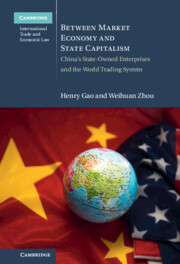 Between Market Economy and State Capitalism
Between Market Economy and State Capitalism Published online by Cambridge University Press: 10 November 2022
Chapter 5 discusses the great potential of China-specific rules on pricing and commercial behaviour of SOEs, coupled with WTO rules on subsidies both in the original Agreement on Subsidies and Countervailing Measures (SCM Agreement) and further elaborated in China’s WTO Accession Protocol. In particular, in response to the argument that WTO subsidy rules have been rendered ineffective by the AB’s interpretation of the term ’public body’, we argue that the utility of the provision has been rehabilitated by the AB’s subsequent decision in US–Countervailing Measures (China) (Article 21.5). Moreover, even the original ’authority-based’ test is no longer an insurmountable hurdle due to the back-tracking of China’s SOE reform in recent years, which resulted in more micro-management by the Party and state in the management of SOEs. Thus, the best way to tackle China’s state capitalism is through WTO litigation based on existing rules discussed in this chapter.
To save this book to your Kindle, first ensure no-reply@cambridge.org is added to your Approved Personal Document E-mail List under your Personal Document Settings on the Manage Your Content and Devices page of your Amazon account. Then enter the ‘name’ part of your Kindle email address below. Find out more about saving to your Kindle.
Note you can select to save to either the @free.kindle.com or @kindle.com variations. ‘@free.kindle.com’ emails are free but can only be saved to your device when it is connected to wi-fi. ‘@kindle.com’ emails can be delivered even when you are not connected to wi-fi, but note that service fees apply.
Find out more about the Kindle Personal Document Service.
To save content items to your account, please confirm that you agree to abide by our usage policies. If this is the first time you use this feature, you will be asked to authorise Cambridge Core to connect with your account. Find out more about saving content to Dropbox.
To save content items to your account, please confirm that you agree to abide by our usage policies. If this is the first time you use this feature, you will be asked to authorise Cambridge Core to connect with your account. Find out more about saving content to Google Drive.